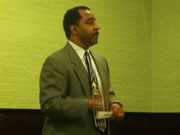It’s obvious that nothing could have prepared America for Sept. 11, but in the aftermath, elected officials have voiced an interest in developing a plan that would.
Before officially stepping into his new shoes, Governor-Elect James McGreevey has begun putting together such a plan with a consortium of New Jersey officials. Meeting with this "task force" for the first time on Tuesday, McGreevey outlined the basic points to address prevention and response standards the state should practice.
Not surprisingly, Mayor Glenn Cunningham, who coordinated rescue and relief efforts from Jersey City’s waterfront on the day of the attacks, was invited to serve on the task force by the governor-elect.
Within 30 minutes of the September attacks, Jersey City had declared a state of emergency. According to Cunningham, his experience as a lifetime law enforcer enabled him to respond with the required immediacy. As hundreds of fleeing citizens arrived on the shores of Jersey City, emergency medical services provided first aid and treatment. Furthermore, the Jersey City Fire Department immediately sent a truck across the river to assist the rescue efforts at the World Trade Center.
Cunningham, a former U.S. Marshal, said that his law enforcement experience on a local and federal level enabled him to give the task force added insight. "I feel very comfortable doing this," Cunningham said. "It’s kind of natural for me with my experience as a U.S. Marshal. I was always on standby because of potential threats."
While safety has become a key issue, however, the cost of safety has become ever more apparent as Jersey City continues to struggle with overtime accrued during the weeks following the attacks. Originally, the Federal Emergency Management Agency (FEMA) guaranteed that Jersey City would be reimbursed for all costs associated with the attacks. No money has been received so far and in recent weeks city officials have said that FEMA has scrutinized each item, refusing to pay for many of them.
During the meeting with the 35-member task force, Cunningham addressed this point and called for guidelines local municipalities can turn to. "Local people have to know more clearly how we’ll be compensated for that type of emergency," Cunningham said. "No city this close to a major metropolitan area wants to feel that it should hesitate because it feels that the cost that it would incur won’t be handled by the state or federal government.”
McGreevey’s plan briefly addresses the financial element of these security measures, promising to ensure that "New Jersey is leveraging every possible dollar to support the state’s efforts to prevent and fight terrorism." He also wants to gain assistance from private companies, including the telecommunications and pharmaceutical industries.
The broad strokes of the governor-elect’s initial plan focus on local, state, and federal agencies working together. The plan aims to make the state secure by pointing out areas in need of increased security, and maximizing the state’s financial resources to guarantee new initiatives.
Cunningham said it was important for government agencies to develop a relationship with utilities companies as a security measure. Speaking to a representative of PSE&G after the meeting, Cunningham suggested that regional municipalities meet with utility companies to further discuss security measures. "The World Trade Center attacks showed us that it’s not just police and firefighters [that are] needed," Cunningham said. "It’s multiple institutions."
Although no subsequent meetings had been scheduled as of press time, Cunningham said the committee intends to meet periodically to work out details of the plan.
